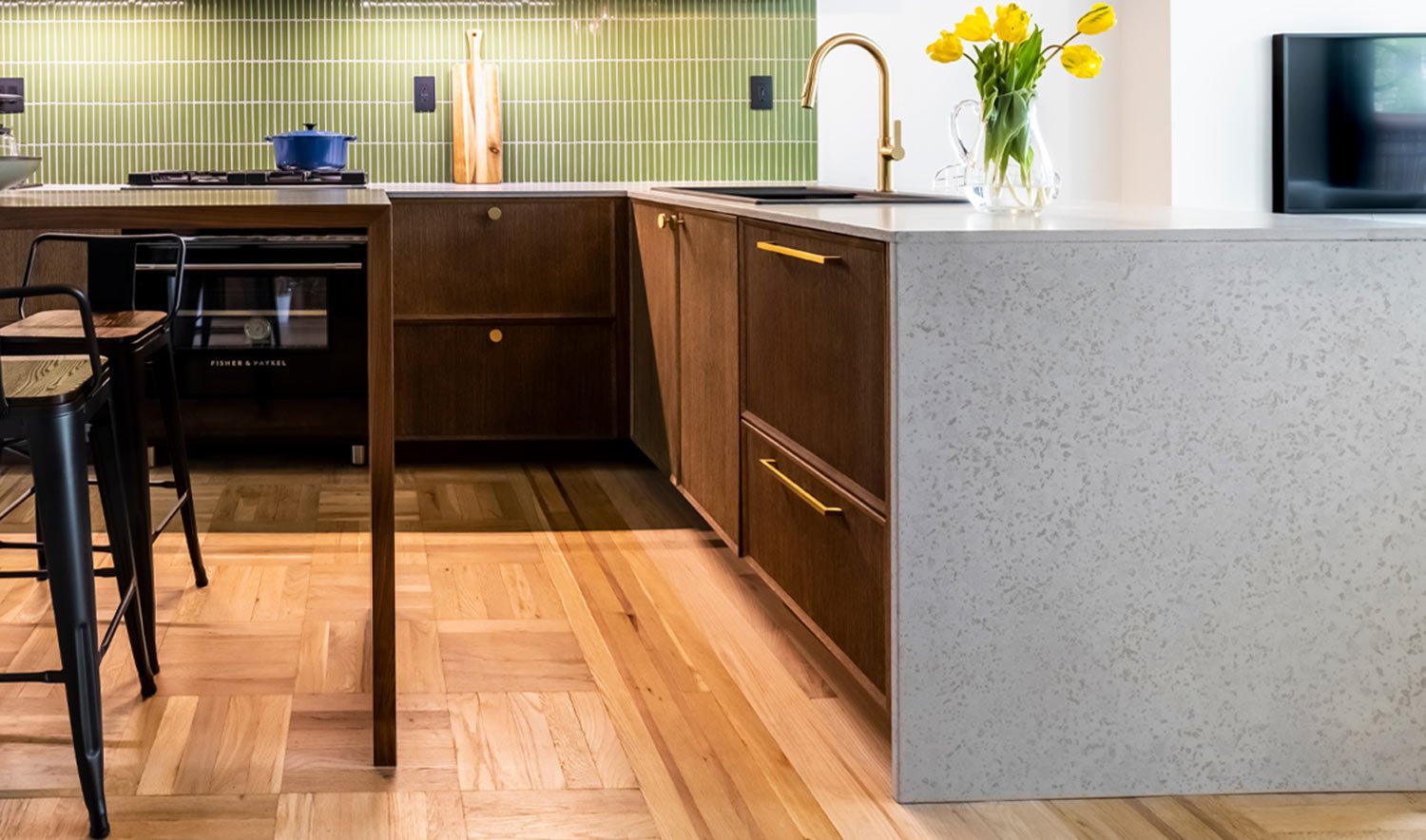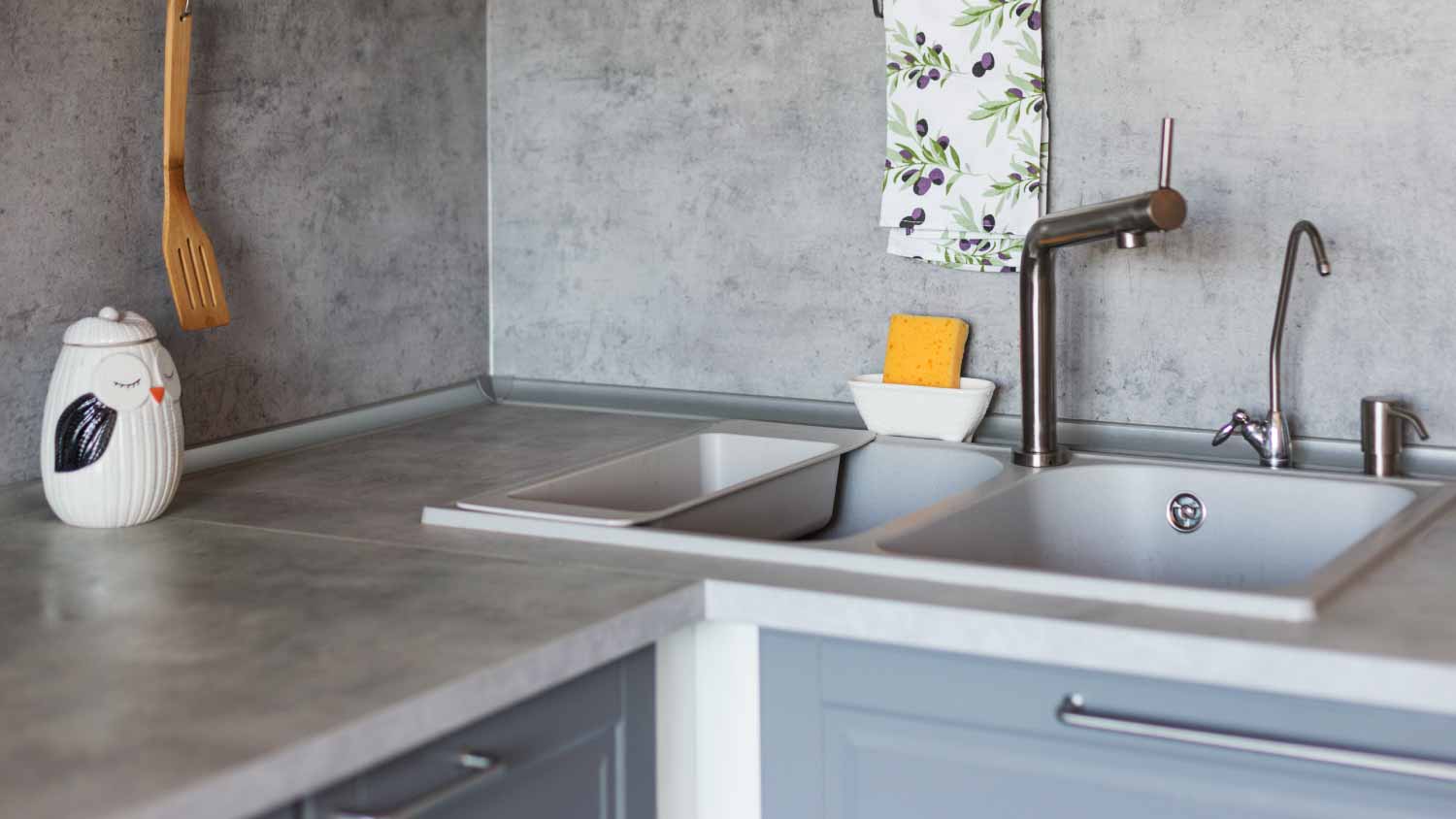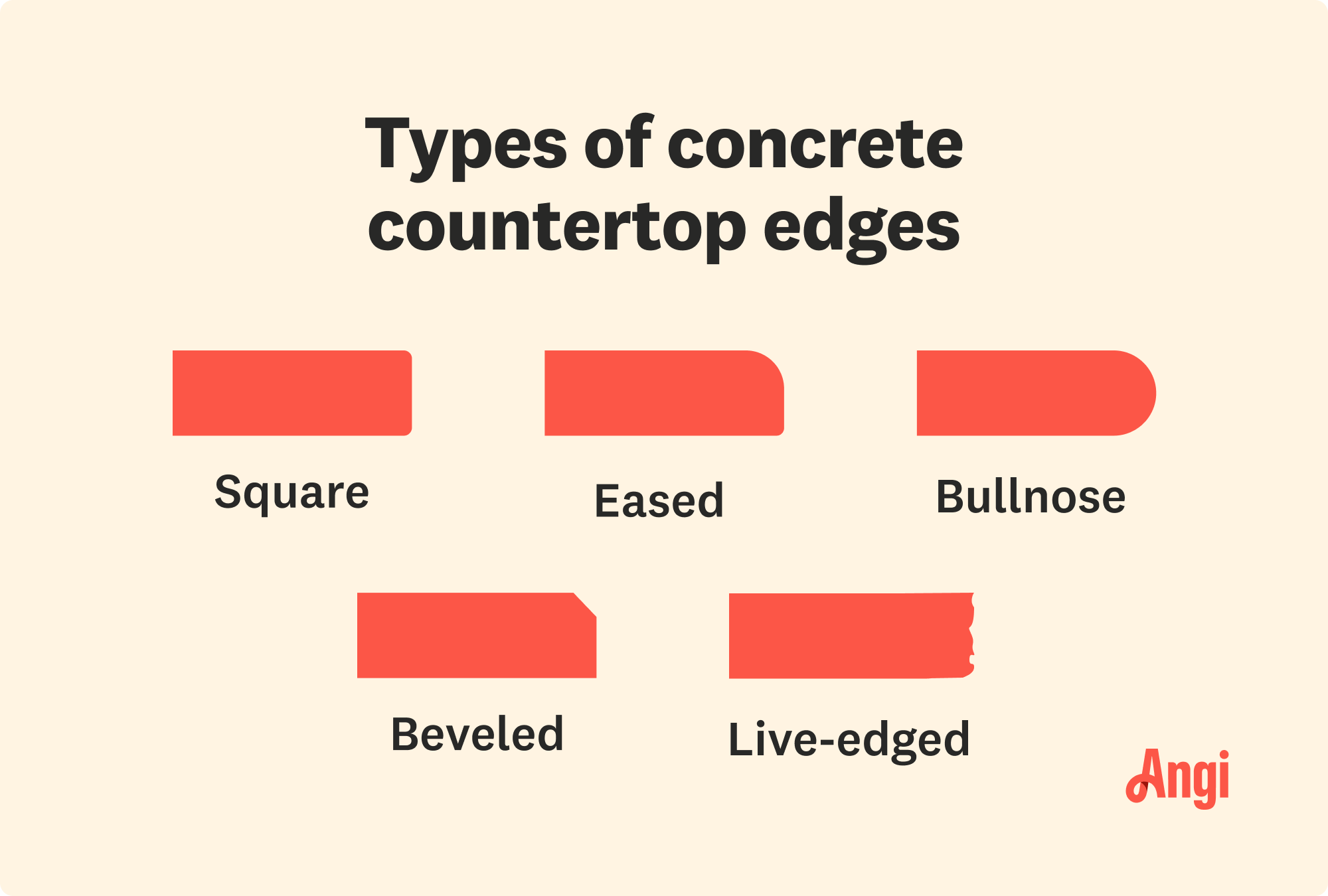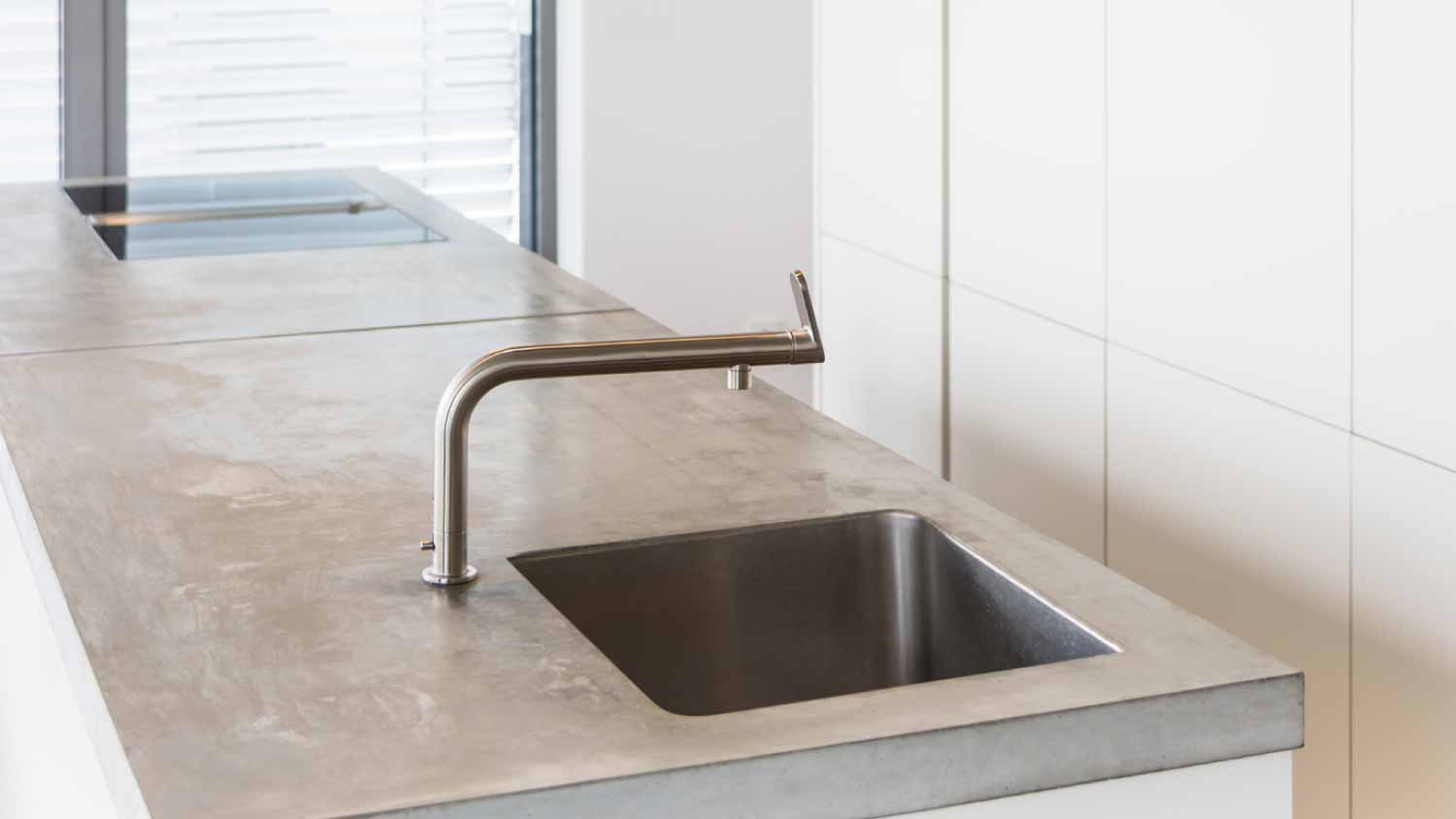
Discover the cost of installing laminate countertops, including how their size, material, and finish impact your total price.
Learn what's great (and not so great) about this trendy countertop material


Concrete countertops usually cost $50 to $150 per square foot.
This material is heat resistant, but prone to cracking.
Concrete countertops can last decades with proper maintenance.
Concrete is heavy and difficult to pour, so you may need professional installation.
Concrete is a great option for unique, custom designs.
Trendy, chic, and versatile, concrete countertops continue to be incredibly popular. They can be customized in all kinds of different ways, making it easy to find the right fit for your unique aesthetic. You will want to consider all of the concrete countertop pros and cons before committing to this material long-term.
Some people use the term “cement countertops” and “concrete countertops” interchangeably. This is not wrong. Cement is an ingredient used to make concrete. When mixed with water, it works as a binding agent to hold together the aggregate that makes up the sturdy surface of your countertop. In other words, concrete countertops are also cement countertops.
Learn more about this trendy material so you can figure out if it is the right fit for your look and lifestyle.

There are many reasons to fall in love with concrete countertops.
Concrete is incredibly hard, so with proper maintenance, you can enjoy your concrete countertop for many, many years. It is also scratch resistant, so you do not have to worry about dishes, silverware, and other common kitchen items leaving superficial scratches as you go about your day. There are a few ways to sand concrete to buff out imperfections. Plus, if you do see a scratch, chances are it is the sealant layer that has been scratched, rather than the concrete itself, so you can usually fix it by applying more sealant.

When you think of concrete, you probably think of a slate gray—but not so fast. One of the biggest advantages of concrete countertops is how many different styles and colors they come in. There is a concrete countertop idea to suit any aesthetic.
You can add a stain or pigment, depending on what look you want. Staining typically gives a concrete countertop a look that mimics natural stone, like granite or quartzite. Meanwhile, pigment can turn concrete into virtually any color under the sun, making these countertops a great choice for anyone with very particular color preferences.
A skilled countertop contractor near you can also add artistic elements, including tile, glass, and shells, right into the countertop, transforming it into a functional work of art.
In addition to coming in different colors and styles, concrete can be poured to fit any shape. So, if you have a super unique countertop layout or small nooks and crevices you want to fill, concrete is a great choice. It is also easy for contractors to cast custom features onto your concrete countertops, like drainboards and soap dishes, making life that much more streamlined.
A lot of kitchen countertop materials, such as wood, do not stand up well to high heat, so homeowners often need to put down a trivet before placing a hot pot or pan on the countertop. But concrete is highly heat resistant, so you can transfer a hot pan from the stove directly to the surface without fear of damaging your beautiful new counters. Keep in mind that heat can damage the sealant on kitchen concrete countertops unless you choose one that is specifically heat resistant.
If your concrete countertop has minor damage, it is usually fairly simple to fix. It is not like laminate, where you would need to replace the damaged material. Instead, you can typically sand and polish the surface to remove minor imperfections. For larger cracks and chips, you can use an epoxy filler or concrete patching agent.
While it is difficult to discern an actual return on investment, many people believe concrete countertops increase a home’s value, similar to the way in which a quartz or natural stone countertop would. Since this is a premium product, it is considered an asset that may attract potential buyers.

No material is perfect, so there are some drawbacks to consider before installing concrete countertops.
Not generally considered a budget-friendly option, concrete countertops cost more than many other types of countertop materials, such as laminate or acrylic. They are similar in price to other high-end countertop materials, like marble and quartzite. Depending on the style and customizations you choose, expect to pay between $50 and $150 per square foot for concrete countertops.
While it is true that concrete is very long lasting, it does require regular care to maintain strength and durability. Because concrete is porous, it is highly susceptible to staining unless sealed with a water-based wax sealant about once each year (or, ideally, monthly). If the sealant deteriorates, it is very easy for a quick spaghetti spill to turn into a forever stain, so you will want to clean up promptly.
Sometimes concrete countertops develop hairline cracks due to natural shrinkage over time. Many contractors, however, reinforce concrete by adding fiber, rebar, and/or wire mesh, which can significantly reduce the risk of cracks. Thankfully, hairline cracks are not typically very noticeable, and repairing them is often straightforward. So, if you spot one, you do not have to replace your entire countertop.
Out of all the cement countertop pros and cons, staining is an issue you can get ahead of. Similar to natural stone countertops, this porous material is highly susceptible to staining. It is especially true if knives scratch the existing layer or sealant or if it is exposed to acidic cleaners and spills (think vinegar or soda). Even a drop of olive oil can seep into the surface causing a hard-to-remove mark. When you install concrete countertops, make sure you seal them with a high-quality sealer, then reseal them periodically using wax.
Although they are typically only 1.5 to two inches thick, concrete countertops can be massively heavy, often weighing 19 to 25 pounds per square foot. This extra weight can take a toll on your cabinets—and even the kitchen floor—so your professional may need to install reinforcements during installation.
Depending on the damage, it may be difficult to repair concrete countertops on your own. You can fill large cracks with a cement patching kit, only for those cracks to reappear because you did not address the underlying issue. Improper installation, poor weight distribution, and a poor design with large overhangs can all cause cracks. You will need to bring in a pro to get things sorted.
Concrete countertops require very specific maintenance due to their porous nature. You will need to reseal them at least once a year with a water-based wax sealant. Ideally, you should seal them once a month, especially if they are subject to heavy use. Beyond that, follow these everyday maintenance tips:
Always use cutting boards to avoid scratching and damaging the sealant.
Avoid highly abrasive or acidic cleaners that can damage the sealant.
Clean up spills immediately with a gentle cleanser.
Hairline cracks are normal, but bring in a pro to handle larger cracks and chips.
Many homeowners turn to DIY concrete as a budget-friendly kitchen countertop idea. The material itself is extremely affordable. It is the labor that drives up costs—and that labor is expensive for a reason.
Pouring concrete is a difficult and messy process. It requires meticulous measurements, both for mixing and installation, and the slabs are extremely heavy. If you do not get a good cure or there is an imbalance of weight, your concrete could crack and damage your countertops and flooring. It is best to leave this job to a pro, unless you have experience.
When hiring a pro for concrete countertop installation, homeowners should expect to pay $1,500 to $6,000, or an average of $3,500. This estimate is based on 35-square-foot countertops, so larger spaces will be more expensive.
The high price associated with concrete countertops is primarily due to the cost of labor, as molding, pouring, and sealing lead to hourly rates between $30 and $90 for contractors. Materials alone cost just $5 to $15 per square foot, but we recommend hiring an expert because of the project’s difficulty.
From average costs to expert advice, get all the answers you need to get your job done.

Discover the cost of installing laminate countertops, including how their size, material, and finish impact your total price.

The cost of stainless steel countertops may seem shocking compared to laminate, but their durability may be worth it. Here’s how much you can expect to spend.

Explore how much concrete countertops cost to install based on factors like their size, thickness, location, finish, and labor rates.

Looking for a unique countertop material that’s low maintenance, durable, and cost-effective? Check out the pros and cons of porcelain countertops.

Choose between five highly rated countertop materials for your next kitchen remodel, including granite, engineered quartz, butcher block, concrete, and laminate.

If you’re stuck on how to attach a dishwasher to a countertop, these helpful tips can take the strain off the process.